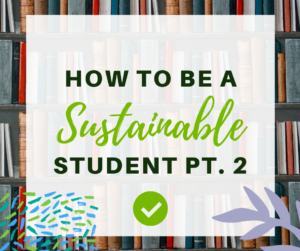- Go Digital
If you don’t like the idea of using paper and chopping down trees, then you can opt to a more digital way of studying for exams or doing your homework.
– Most school textbooks can be found online these days which makes it easier for students to access without having to carry a large book around and giving us scoliosis.
It also can save a ton of paper and ink, which can harm the environment if we keep mass producing some of these textbooks, this is especially true when a book gets out-dated and they have to be thrown out. Then you would have to replace all those books again with newer ones. But for digital textbooks, they can be updated or you can access a different book in the same place without having to waste all that paper and contribute to more landfills.
Plus, with our technology today, we are able to highlight and write on the textbooks, all on one tablet!
– This can also be done with all books, where you could purchase/rent the book online and read from a tablet instead of buying one at the bookstore.
– Other ways to save on paper is doing assignments online, if the teacher is willing to put all the class material online. For example, Google Classroom is a great way to turn in assignments and communicate with the teacher or peers when you need help. Doing this can greatly reduce the amount of paper being used to turn in assignments and other materials like highlighters, which is hard to recycle and can cause a lot of damage to our ecosystem (the plastic and chemicals in highlights).
– However, the downside to this is that not all classrooms can provide tablets for every student, and using their own personal devices can be distracting because they also have their apps on it too. Furthermore, not all students have internet access and viruses and glitches may disrupt their work. We also can’t forget that these things have to be replaced eventually, and throwing them out is very dangerous for our environment if we aren’t careful.
– The biggest con for digital tablets is the fact that it can actually harm the environment too since it is made of 33 pounds of minerals, 79 gallons of water, and 100 kilowatt hours of fossil fuels, creating 66 pounds of CO2. Meaning that printing books create 100x less greenhouse gases than a single tablet.
But of course, you can reduce that by maximizing the electronic products you already have and don’t try to upgrade your products everytime new ones come out. If you do, make sure that your old products get taken care of the proper way. Like finding out where your local retailer is with an electronic recycling program (using https://earth911.com/ for North America).
But all in all, use what you believe works for you, just be mindful of where it comes from and where it goes after you’re done with it (meaning that you’ve used it to it’s limit!). So try to work with what you have and make an effort to keep it as eco-friendly as possible!
- Invest Towards More Durable Things
Choose things that will last 5-10 years, instead of cheap products that last for a few months or a year only. Doing this, it will reduce product wastes and will help you save money because you aren’t having to constantly replace these necessities.
Also check out https://www.jetpens.com/ for some of these products!
– Binders/folders are the biggest way to organize your papers and assignments. But it’s most important to buy long lasting ones so that they can be used over and over again. Then you don’t have to keep throwing out old ones and replacing them every year.
– Buy refillable pens to reduce the amount of plastic thrown into landfills.
– Look for eco-friendly school supplies that are biodegradable
– Backpacks. Purchase a good quality and sustainable backpack that can last up to ten years. Yes, it will be expensive, but it will be worth it because it will last longer and you will contribute less waste to the environment.
Sukalich, Kathryn. “Everything You Need to Know About Paper Recycling.” Earth911.Com, 14 Jan. 2020, earth911.com/business-policy/business/paper-recycling-details-basics/.
Tbhstudying. “eco-friendly tips for students.” YouTube, 8 Feb. 2020, https://www.youtube.com/watch?feature=youtu.be&v=Ql23uQza7Qo. Wills, Amanda. “Ask the Editor: Recycling Wax Paper.” Earth911.Com, 17 Aug. 2015, earth911.com/food/ask-the-editor-recycling-wax-paper/.
